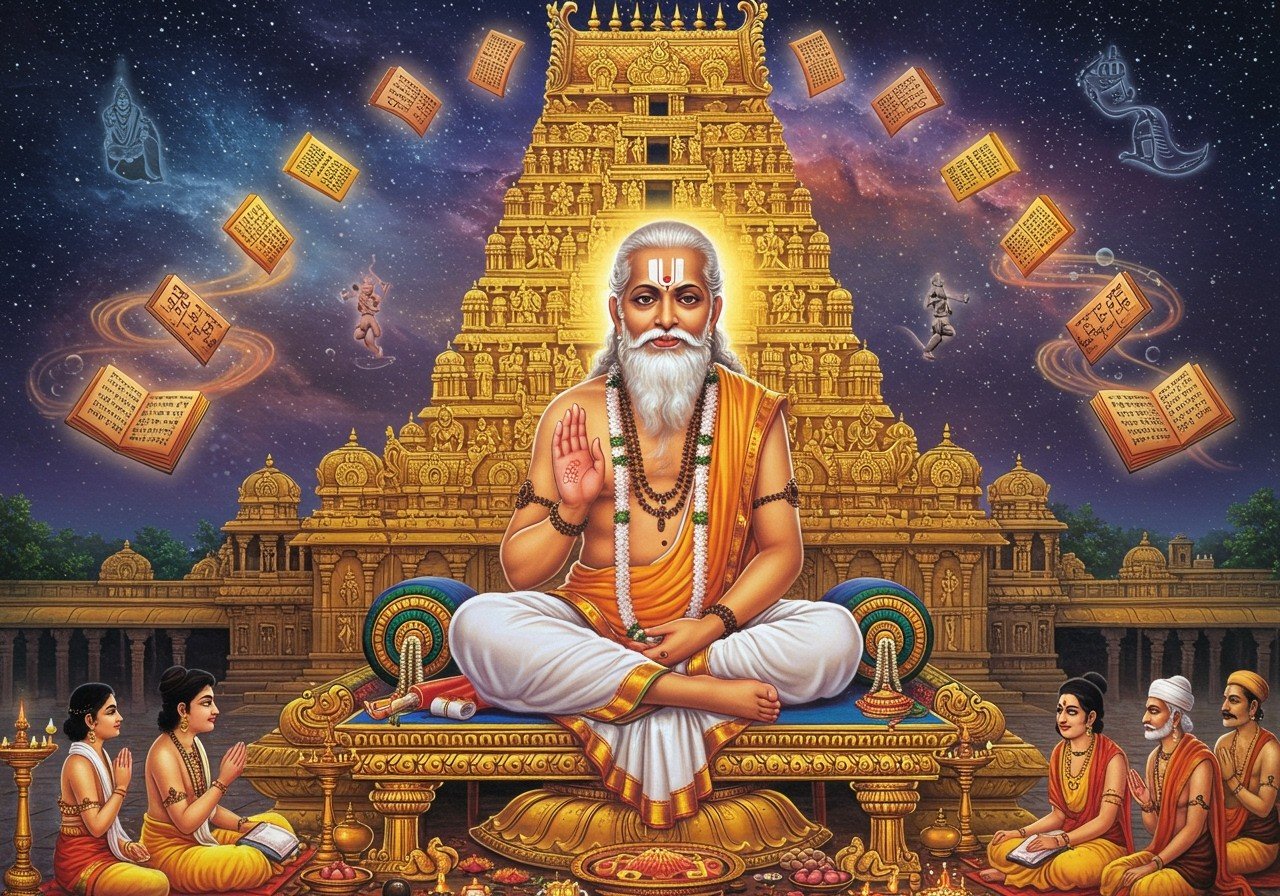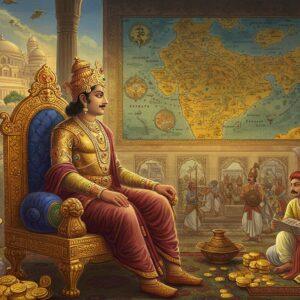
In the intricate world of Hindu philosophy, Ramanuja emerges as a significant figure whose teachings have profoundly impacted spiritual practices. Born in 11th-century India (1017 CE), his ideas challenged prevailing norms, emphasizing devotion (bhakti) as a central path to salvation. Delving into Ramanuja’s life and contributions provides valuable insights into his enduring influence on modern Hinduism.
Early Life and Education
Ramanuja’s journey began in 1017 CE in Sriperumbudur, Tamil Nadu, within a respected Brahmin family. His initial education was under the tutelage of the Advaita scholar Yadava Prakasha. However, Ramanuja’s quest for deeper understanding led him to diverge from Advaita, engaging with the Vaishnavite teacher Yamunacharya. These early interactions molded his philosophical perspective, forming a foundation for his groundbreaking work. His early life reflects the transformative journey of a spiritual seeker evolving into a revered philosopher, championing devotion as the path to enlightenment.
Rise as a Philosopher and Spiritual Leader
Ramanuja’s evolution into a revered philosopher and spiritual leader is an inspiring narrative. Departing from Advaita teachings, he embraced the Vaishnavite tradition, eventually leading the Srirangam temple, a crucial center for Vaishnavism. This appointment was a turning point in his life. His leadership extended beyond the temple walls, marked by revolutionary inclusivity. He opened temple doors to people of all castes, emphasizing that devotion transcended social hierarchies. This groundbreaking act fostered unity and accessibility in worship. Ramanuja’s travels across India disseminated the teachings of Vishishtadvaita, his philosophy of qualified non-dualism. He established a network of followers and institutions, laying the foundation for a lasting spiritual movement. These travels were not merely geographical but spiritual expeditions.
Philosophy of Vishishtadvaita
Central to Ramanuja’s teachings is Vishishtadvaita, “qualified non-dualism.” This philosophy offers a nuanced perspective, balancing the concepts of oneness and diversity. It proposes that while all souls and the universe are part of Brahman, the ultimate reality, they retain their individual identities. This contrasts with Advaita Vedanta, which perceives Brahman as formless. Vishishtadvaita views Brahman as a personal God possessing attributes like consciousness, bliss, omnipresence, and infinite auspicious qualities. Ramanuja highlighted the interconnectedness of the individual soul (jiva), the universe (prakriti), and God (Brahman), a relationship at the heart of his philosophy. Ramanuja advocated bhakti, or devotion, and self-surrender (prapatti) to God as paths to moksha, liberation from the cycle of birth and death. His teachings underscore the significance of love and dedication in spiritual pursuits. He emphasized living a life dedicated to the deity, offering all thoughts, words, and actions as service.
Literary Contributions
Ramanuja’s profound insights are preserved in his writings. The Sri Bhashya, a commentary on the Brahma Sutras, stands as a foundational text of Vishishtadvaita. His Gita Bhashya, a commentary on the Bhagavad Gita, explores devotion and duty. The Vedartha Sangraha presents his interpretations of the Vedas. These works, influencing generations of thinkers, have left an enduring impact on Hindu philosophy, guiding those seeking spiritual understanding through devotion. They showcase his theological depth and offer valuable insights into Vedic wisdom.
Legacy and Influence
Ramanuja’s legacy continues to shape India’s spiritual landscape, profoundly influencing later Bhakti movements and spreading Vishishtadvaita throughout South India. His teachings, diligently preserved by his followers and religious institutions, resonate deeply within contemporary Hindu practices. His focus on devotion and inclusivity continues to inspire spiritual discourse. His vision of a unified yet diverse spiritual community guides seekers toward enlightenment. The preservation of his teachings ensures their relevance and impact in modern times.
How Poojn Helps You Honor Ramanuja’s Teachings
Poojn.in offers a wide selection of products for devotees following the Vishishtadvaita tradition. These include items like Gopichandana and Kumkum for Sri Vaishnava Tilak, traditional brass and copper vessels for temple worship, and pure cotton Vastram and Angavastram. We also offer Tulsi malas and stands for personal devotion, Pancharatra Agama texts and prayer books, and Vishnu puja items like conch shells and bells. Find authentic puja items here. Explore our complete range of products at www.poojn.in and enhance your spiritual practice.
Conclusion
Ramanuja’s life and teachings form a bridge between ancient wisdom and contemporary understanding. His Vishishtadvaita philosophy provides a unique perspective, harmonizing unity and diversity. By championing inclusivity in religious practices, he not only transformed traditions but also fostered equality and devotion that continue to flourish. His emphasis on devotion offers guidance and solace to spiritual seekers. His legacy endures not only in his writings but also in the hearts of those inspired by his teachings of love, devotion, and inclusivity. For those on a spiritual journey, Ramanuja’s life serves as a guiding light, illuminating the path with wisdom and compassion. Embracing his philosophies can enrich spiritual experiences, blending ancient traditions with modern insights.
FAQs on Ramanuja
Who was Ramanuja? Ramanuja was a prominent Indian philosopher and theologian born in 1017 CE. He significantly developed the Vishishtadvaita (qualified non-dualism) system of philosophy. His teachings emphasized devotion (bhakti) to God and the importance of community in spiritual life, challenging traditional social hierarchies.
What did Ramanuja preach? Ramanuja preached the philosophy of Vishishtadvaita, “qualified non-dualism.” This philosophy states that the individual soul and God are distinct yet interconnected. Devotion and surrender to God are essential, and salvation is attainable for all through love and service. He advocated for a personal relationship with God and the importance of understanding the divine attributes.
What is the essence of Ramanuja’s philosophy? The core of Ramanuja’s philosophy is Vishishtadvaita, blending dualism and non-dualism. He believed in a personal God with attributes, asserting that the world and individual souls are real but dependent on God. Devotion is key to understanding this intricate relationship. This dependence is not a limitation but a testament to the interconnectedness of all beings with the divine.
How did Ramanuja influence Hinduism? Ramanuja profoundly influenced Hinduism by furthering the Bhakti movement, emphasizing personal devotion to God. His teachings shaped Vaishnavism, promoting worship through love and service over rigid rituals. He emphasized the accessibility of spiritual practices for all, irrespective of social standing.
What are some key works of Ramanuja? Ramanuja’s influential texts include the Sri Bhashya, a commentary on the Brahma Sutras, and the Bhagavad Gita Bhashya, a commentary on the Bhagavad Gita. These works solidified Vishishtadvaita philosophy, offering profound interpretations of core Hindu scriptures and providing guidance for spiritual practice.
Why is Ramanuja considered a significant philosopher? Ramanuja’s significance lies in his balanced approach to understanding God and the universe. Combining devotion with philosophical reasoning, he made spiritual teachings accessible and relevant. His inclusive approach to religious practice broke down social barriers and fostered a sense of community.
What impact did Ramanuja have on society? Ramanuja’s societal impact includes promoting equality and inclusivity in religious practices. He encouraged people of all backgrounds to worship together, dismantling caste barriers and nurturing community and devotion. His emphasis on social equality continues to inspire and influence modern interpretations of Hindu practices.


